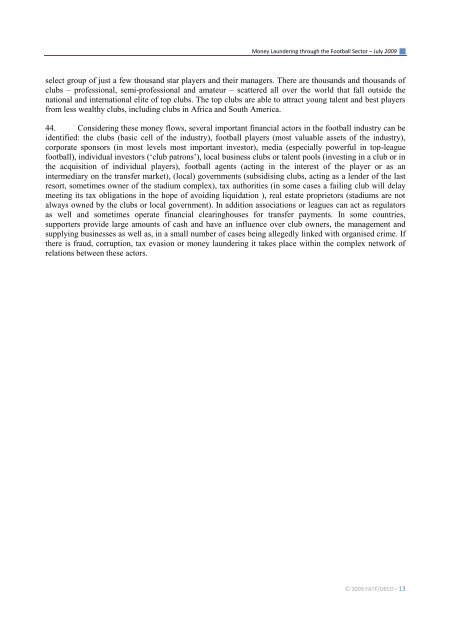Money Laundering through the Football Sector
Money Laundering through the Football Sector
Money Laundering through the Football Sector
You also want an ePaper? Increase the reach of your titles
YUMPU automatically turns print PDFs into web optimized ePapers that Google loves.
<strong>Money</strong> <strong>Laundering</strong> <strong>through</strong> <strong>the</strong> <strong>Football</strong> <strong>Sector</strong> – July 2009 <br />
select group of just a few thousand star players and <strong>the</strong>ir managers. There are thousands and thousands of<br />
clubs – professional, semi-professional and amateur – scattered all over <strong>the</strong> world that fall outside <strong>the</strong><br />
national and international elite of top clubs. The top clubs are able to attract young talent and best players<br />
from less wealthy clubs, including clubs in Africa and South America.<br />
44. Considering <strong>the</strong>se money flows, several important financial actors in <strong>the</strong> football industry can be<br />
identified: <strong>the</strong> clubs (basic cell of <strong>the</strong> industry), football players (most valuable assets of <strong>the</strong> industry),<br />
corporate sponsors (in most levels most important investor), media (especially powerful in top-league<br />
football), individual investors („club patrons‟), local business clubs or talent pools (investing in a club or in<br />
<strong>the</strong> acquisition of individual players), football agents (acting in <strong>the</strong> interest of <strong>the</strong> player or as an<br />
intermediary on <strong>the</strong> transfer market), (local) governments (subsidising clubs, acting as a lender of <strong>the</strong> last<br />
resort, sometimes owner of <strong>the</strong> stadium complex), tax authorities (in some cases a failing club will delay<br />
meeting its tax obligations in <strong>the</strong> hope of avoiding liquidation ), real estate proprietors (stadiums are not<br />
always owned by <strong>the</strong> clubs or local government). In addition associations or leagues can act as regulators<br />
as well and sometimes operate financial clearinghouses for transfer payments. In some countries,<br />
supporters provide large amounts of cash and have an influence over club owners, <strong>the</strong> management and<br />
supplying businesses as well as, in a small number of cases being allegedly linked with organised crime. If<br />
<strong>the</strong>re is fraud, corruption, tax evasion or money laundering it takes place within <strong>the</strong> complex network of<br />
relations between <strong>the</strong>se actors.<br />
© 2009 FATF/OECD - 13


